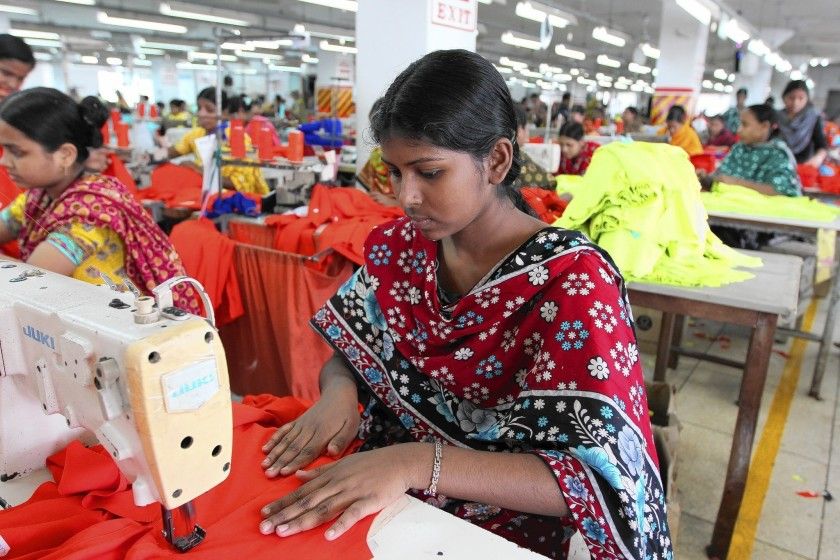
The life and struggle of local garment workers in Corona period
(BASF)
Garment workers' wages, living standards, safe working environment, workers union rights and other issues are discussed at national and international levels throughout the year. A large section of the people can know about the life and professional problems of the garment workers for the welfare of the media. And in the midst of the corona virus epidemic, the owners and the government have reached out to the marginalized people in the remote rural areas to talk about the miserable lives of the garment workers. But there is no discussion anywhere in the country about the millions of workers working in local garments who make garments. Corona is cutting their lives in what conditions; Nowhere is this news. But the country's domestic market continues to play an important role in the life and economy of the society by making shirts, pants, vests, Punjabis, jackets, women's clothing, baby suits (complete sets of children) for low-income families. Local garment workers make up a large part of the pageantry from Bahari (fashionable) Shopping Mall to the city's sidewalks with the rise of the city in the late 90's. The journey of this industry in a small range of 75 years later. At present it has become a means of livelihood for a large part of the population. A large part of the local garment factories are located at Siddique Bazar, North South Road, Kamrangir Char, Lalbagh, Maniknagar, Shanir Akhra, Signboard, Kaliganj, Keraniganj, Narayanganj, Savar. A large part of the readymade garments are made in all these factories. Apart from this, there are some factories in Syedpur, Bogra, sylhet and other divisional cities and some districts.
Most of the local garment workers are in the age group of 18-25 years. This age is as conducive to exploitation as it is to the food of war in the need to capture the market for the sake of capital. Most of those who are a little older are cutting masters. And the youngest helper. Depending on the type of work, the various positions include Cutting Master, Body Man, Collar Man, Holdman (button house), Fit of the Man (sewing under the bogle), Iron Man, Helper - all of these positions. All except Holdman, Fit of the Man and the Spinning Helper are pitch rate workers. Although they have worked for 12 months, they are not recognized as permanent workers. Owners and moneylenders determine the pitch rate. The market price has nothing to do with this determination. The increase in pitch rate depends on the will of the moneylenders. As the bait of pitch rate is hung, the workers work hard day and night to break bones in the hope of earning extra. The big reason for being able to do this extra work is their age. Another major reason why workers are deprived of their rights is their unawareness. This method of pitch rate or furan work is profitable for the owner and the capital. The owners of local garments are recklessly squeezing the vitality of the workers in their desire to own small capital to large capital. The workers of this industry work from 9 am to 2 pm, then with a break of 2 hours from 4 pm to 11 pm; And during the working season (New Year, Eid, Puja Parvan) they are forced to work till 3 o'clock at night. These workers stay in the factory and sleep. It would be wrong to say sleep, after a broken bone toil, the tired body falls asleep. That is why there is no disturbance in the sleep of the workers even though there are severe bugs in every factory. When he looks at his body after waking up, he sees a bite of a beetle. Wherever you work, eat and sleep. Workers get jaundice, shortness of breath, tuberculosis and skin diseases while working in this unhealthy environment. And after working for 5/6 years, most of the workers have eye problems. Since it is not possible to stay in Dhaka by renting a house with the family with the job money, some workers take four or five separate houses at a time in the mess. Excessive work, unhealthy environment, just two handfuls of rice to satisfy hunger. After 10 years of service, including the uncertainty of life, when you see a broken body, it seems that you are in your fifties.
There are two types of owners in this industry. One is those who have factories and institutions; They are called direct moneylenders (producers and marketers). And those who only have factories; They are called wage moneylenders. These moneylenders are just as concerned about their own profits as they are about the exact opposite of the lawful payment of the ruthless workers. The workers in this industry understand the law to mean the words of the owner. And when the owners speak on their faces, they are verbally abused, beaten and sometimes kicked out without paying any dues. Due to the weakness of the organization in the interest of the workers, coming from different parts of the country, none of them are voters in their respective areas, so the voters do not want to stand by them. All in all, these workers admit to cruel cruelty. Double wages for overtime work, two Eid festival bonuses a year, weekly leave on self-pay, casual leave, medical leave, annual leave, festival leave, etc. are the rights of workers in this industry like a dream. Surprisingly, the owners of this industry pay wages in two installments a year during the two Eids. Workers pay a portion of their wages to their employers every week for rice bills, breakfast money and other daily expenses, which is less than 5/6 thousand taka per month in total. The extreme acknowledgment of cruelty is that even though these workers drink water while working, the owners of most of their factories deduct money separately from wages as water bills. Apart from this, the workers have to take extra 1/2 thousand taka from the owners while going home. He goes home 5/6 times a year including two Eids, Pahela Baishakh. Workers can earn 12-15 thousand taka per month as back rate. Excluding this money, other expenses including food bill of Rs. Going home 5/6 times a year costs another 8-9 thousand taka. Excluding this amount from 8-10 thousand taka, the average wage per month is 8,250 taka. Although the factory is open for 12 months, the work is basically 9 months. Every year the workers are eager to get all the dues on their way home on Eid-ul-Fitr. The various dreams of the workers are involved with this money. But this time the Corona situation came at a time when it was like a total darkness in the lives of local garment workers. Life does not want to go on like this. The extra work that you do during the fasting period earns you extra money and goes on all year round. If there is work, there is inhuman work and if there is no work, there is extreme uncertainty of survival. The corona virus has taken away their work as well as their rice. However, in an exploitative society, the lives of workers are always in uncertainty. Although the government has announced an incentive of Tk 5,000 crore for the export-oriented garments industry and financial assistance of Tk 60 crore for unemployed workers, the government has not provided any assistance to local garment workers. Even then, in the midst of hundreds of sorrows, life sometimes seems to want to laugh. Due to the corona virus epidemic, it is easy to understand how the lives of local garment workers and their families will go this time. Workers do not need to be experts or statisticians to understand this life. Even then, who knows how many necessities of life are being hidden in the maelstrom of statistics in the conventional society? How much of this truth or we know. The owners of local garments are not looking for such workers. At the same time, the workers call the owners for the arrears but do not receive them. In this predicament, if the owners had paid their arrears of 6 months' wages, they could have somehow survived. Who will take this responsibility? The government is with the owner all the time.
In the global corona situation, in the name of keeping the wheel of production running in the interest of investment capital and brokerage capital, workers and working people were put at risk of the corona virus and their lives were turned off. New duties are bringing to the fore the overall reality of the society not the local garments. The precondition for the safety of local garment workers is a safe society and a society free from exploitation. The Corona virus pointed the finger at the futility of the conventional capitalist economy and system. Today, in order to survive, the lives of the working peasants and the majority of the people are tied to the same thread. At present, the responsibility of the local garment workers is to join hands in the struggle to establish an exploitation-free society in order to live with human rights by refusing to live without dignity. And to establish a self-governing society free of stateism and capitalism by strengthening the movement of anarcho- syndicalism.


